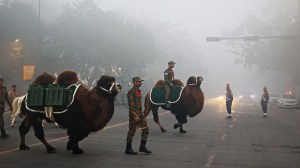Beastly tales
Community justice is a monstrous thing on the subcontinent. Take two recent instances. In Pakistan, in a remote Multan village, an 18-year-o...

Community justice is a monstrous thing on the subcontinent. Take two recent instances. In Pakistan, in a remote Multan village, an 18-year-old girl is gangraped as 8216;punishment8217; for her brother8217;s 8216;crime8217; of courting a woman from a superior tribe. Closer home in Indore, young Sangeeta Sode, whose 8216;crime8217; was in embarking upon a trip to Vaishno Devi with a friend without having informed her family, is made to perform an 8216;agni pariksha8217; to prove her fidelity to her husband. The ceremony entailed the woman carrying a heated iron rod and it was conducted in front of a huge crowd.
Two nations, two cultures, two religions, two differing situations, but the ideological underpinnings that render a woman guilty just for being a woman are remarkably similar. Cases like these are a reminder that women continue to be regarded as symbols of a community8217;s honour and tradition and they will continue to suffer grievously as social scores are settled on their bodies. Such instances also alert us to the fact that the national criminal justice system 8212; always an elusive phenomenon 8212; may as well not exist as far as the majority of women are concerned. Any evidence of it only surfaces after the injury is perpetrated, never in terms of ensuring that it does not occur in the first place.
Things will change only if three conditions are met. One, a criminal justice system that actively incorporates gender concerns in its functioning. This would mean political leaders and government officials publicly condemning such violence and responding with alacrity to evidence of such crime; it would mean training local officials, judges and police personnel on how to address such cases; it would mean monitoring crimes of this nature until justice is done in each case. Second, and most important, is to provide women with the confidence to fight such social abuses by ensuring their own literacy and by putting in place protection mechanisms which they can activate at the community level. The battle, finally, is precisely at the community level, it is here that attitudinal change needs to come about. Even to imagine that such a transformation would actually occur is difficult. But then, if it does not, it is an open acknowledgement that the overwhelming majority of citizens in this region live under the rule of barbaric custom rather than that of modern law.
- 01
- 02
- 03
- 04
- 05































